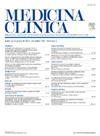采用风险调整方案治疗的新诊断急性髓系白血病细胞遗传改变的预后影响
IF 2.1
4区 医学
Q1 MEDICINE, GENERAL & INTERNAL
引用次数: 0
摘要
背景和目的在急性髓性白血病(AML)中,细胞遗传学改变影响治疗反应,是危险分层的必要条件,尽管有些与预后的相关性不确定。在这项研究中,细胞遗传学改变对一系列新诊断的AML患者的预后影响进行了分析。研究了1994 - 2012年加入CETLAM合作组方案的1417例确诊为新生AML(无t(15;17)或PML::RARA)的成人患者的细胞遗传学特征,并评估其对生存的影响。结果多变量分析显示,t(8;21)和inv(16)/t(16;16)等异常预示预后良好,其他异常对预后无显著影响。相反,7号染色体单体、1号染色体结构改变、复杂核型(5个或更多异常)和单染色体核型等异常与较差的结果相关。根据患者的细胞遗传学改变将其分为三个预后组,这证明了所提出的系统在预测预后方面的有效性。结论:本研究证实了细胞遗传学改变对急性髓性白血病患者预后的影响及其在将患者划分为危险组方面的作用。本文章由计算机程序翻译,如有差异,请以英文原文为准。
Impacto pronóstico de las alteraciones citogenéticas en la leucemia aguda mieloide de nuevo diagnóstico tratada con protocolos adaptados al riesgo
Background and objective
In acute myeloid leukemia (AML), cytogenetic alterations have influence on treatment response and are essential for risk stratification, although some have uncertain prognostic relevance. In this study, the prognostic impact of cytogenetic alterations was analyzed in a series of newly diagnosed AML patients treated with risk-adapted protocols.
Patients and method
The cytogenetic profile of 1417 adult patients diagnosed with de novo AML (without t(15;17) or PML::RARA) enrolled in the CETLAM cooperative group protocols from 1994 to 2012 was studied, and its impact on survival was evaluated.
Results
Multivariable analysis showed that anomalies such as t(8;21) and inv(16)/t(16;16) predict a favorable prognosis, with no significant effect of additional anomalies on outcome. In contrast, abnormalities like monosomy of chromosome 7, structural alterations of chromosome 1, complex karyotype (5 or more abnormalities), and monosomal karyotype were associated with worse outcomes. Patients were classified into three prognostic groups based on their cytogenetic alterations, which demonstrated the effectiveness of the proposed system in predicting prognosis.
Conclusion
This study confirms the prognostic impact of cytogenetic alterations in AML and their usefulness in stratifying patients into risk groups.
求助全文
通过发布文献求助,成功后即可免费获取论文全文。
去求助
来源期刊

Medicina Clinica
医学-医学:内科
CiteScore
3.10
自引率
5.10%
发文量
295
审稿时长
22 days
期刊介绍:
Medicina Clínica, fundada en 1943, es una publicación quincenal dedicada a la promoción de la investigación y de la práctica clínica entre los especialistas de la medicina interna, así como otras especialidades. Son características fundamentales de esta publicación el rigor científico y metodológico de sus artículos, la actualidad de los temas y, sobre todo, su sentido práctico, buscando siempre que la información sea de la mayor utilidad en la práctica clínica.
 求助内容:
求助内容: 应助结果提醒方式:
应助结果提醒方式:


